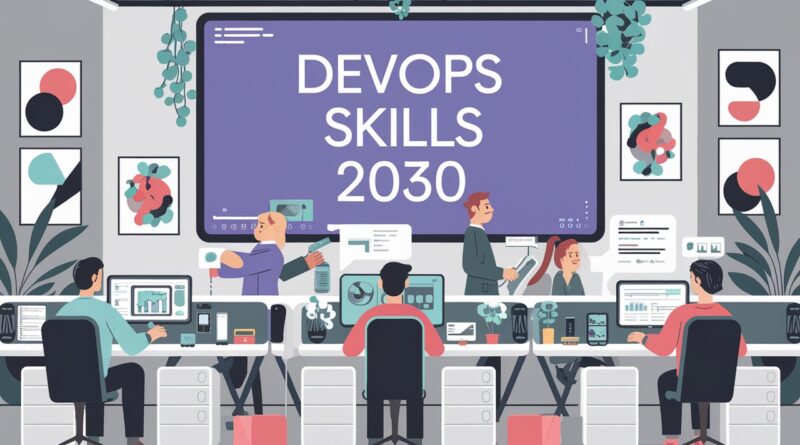DevOps Skills 2030: Predicting the Future Needs of Japan’s Tech Industry
Introduction to DevOps Skills in Japan’s Tech Landscape
Japan’s technology industry has been an early adopter of advanced practices in automation, cloud infrastructure, and software development. The demand for agile, efficient, and resilient IT operations is growing, making DevOps a critical component for achieving operational excellence. As Japan’s tech industry continues to expand, particularly in sectors such as manufacturing, automotive, and finance, the role of DevOps will further integrate into core operations.

DevOps is transforming how Japanese businesses approach software development and deployment. By embracing the DevOps culture, Japan’s tech companies can innovate faster and respond effectively to evolving market needs. As we look towards 2030, understanding the necessary skills for DevOps will be key for organizations to remain competitive.
Future Trends: DevOps Skills Needed by 2030
By 2030, certain DevOps skills are expected to be essential across the technology landscape. With an emphasis on automation, Infrastructure as Code (IaC), and continuous integration/continuous delivery (CI/CD), Japanese companies are likely to see these skills as fundamental for maintaining agile and scalable systems. Additionally, knowledge in cloud-native DevOps and AI/ML integration will be in high demand.

Here is a table of the top DevOps skills forecasted to be crucial for Japan’s tech industry by 2030:
| Skill | Description | Industries |
|---|---|---|
| Automation | Proficiency in automating repetitive tasks | Manufacturing, Automotive |
| Infrastructure as Code (IaC) | Managing infrastructure through code | Telecom, Finance, Manufacturing |
| Continuous Integration/Delivery (CI/CD) | Automating code testing, building, and deployment | Tech, Finance, E-commerce |
| Cloud-native DevOps | Expertise in cloud platforms like AWS, Azure, GCP | Automotive, Telecom, Tech |
| AI/ML Integration | Using AI/ML to enhance operations and predictive maintenance | Telecom, Finance, Manufacturing |
Global and Local Perspectives on the Future of DevOps
The increasing demand for DevOps skills globally reflects a broader trend toward digital transformation. As Gene Kim, author of The Phoenix Project, notes, “DevOps represents a movement that optimizes the speed and stability of IT systems, a capability that will be essential in the coming decade.”

According to the DevOps Institute, “Organizations that invest in DevOps skills today are positioning themselves to be leaders tomorrow.” These sentiments are mirrored in Japan, where executives have highlighted the need for a versatile workforce skilled in DevOps and automation to remain competitive. As Japan’s digital transformation accelerates, DevOps will play a critical role in meeting the evolving demands of the industry.
Why DevSecOps and SRE are Crucial for Japan’s Future
Security is becoming a top priority within DevOps, leading to the rise of DevSecOps. This approach integrates security practices within the DevOps process, ensuring that systems are not only fast and reliable but also secure. As cybersecurity threats increase, Japan’s tech industry must adopt DevSecOps to protect its infrastructure.

Similarly, Site Reliability Engineering (SRE) emphasizes system reliability and scalability. SRE practices are particularly relevant in Japan’s tech sectors, where consistent and reliable system performance is non-negotiable.
Below is a table of the anticipated demand for various DevOps roles in Japan by 2030:
| Role | Description | Projected Job Growth | Average Salary |
|---|---|---|---|
| DevOps Engineer | Implements DevOps tools and practices | High | ¥8M – ¥12M |
| DevSecOps Specialist | Integrates security within DevOps practices | High | ¥9M – ¥13M |
| Site Reliability Engineer | Ensures reliable and scalable systems | Very High | ¥10M – ¥15M |
Popular DevOps Courses in Japan by 2030
To meet the industry’s evolving needs, a variety of courses from the DevOps Institute are popular in Japan. These courses prepare professionals to handle complex DevOps tasks and offer foundational knowledge for DevSecOps and SRE roles.
Here is an overview of these courses and their benefits:
| Course | Description | Industries |
|---|---|---|
| DevOps Foundation Training in Japan | Introduces key DevOps concepts and practices | Tech, Manufacturing, Automotive |
| DevSecOps Foundation Training | Focuses on integrating security in the DevOps pipeline | Finance, Telecom, E-commerce |
| SRE Foundation Training | Covers reliability engineering practices | Telecom, Finance, Automotive |
These top DevOps courses not only cover the technical aspects of DevOps but also focus on cultural shifts needed for successful DevOps adoption. They are ideal for professionals looking to remain competitive in the evolving Japanese tech landscape. Spoclearn is an Accredited Training Organization of DevOps Institute/PeopleCert to deliver all DevOps courses globally across industry sectors for individuals and enterprise teams.
The Role of Continuous Learning and Adaptation in DevOps
Continuous learning is critical for DevOps professionals to keep up with rapid technological advancements. The PeopleCert organization emphasizes the importance of certifications, noting that “Certifications help validate and reinforce the skills necessary to thrive in dynamic roles like DevOps.” As more companies recognize the value of ongoing education, they are likely to support employees in pursuing advanced certifications.
Conclusion: Preparing for the Future of DevOps in Japan
In conclusion, the future of DevOps in Japan promises to be dynamic and full of opportunities. As the industry advances, professionals equipped with skills in automation, cloud-native technologies, and DevSecOps will be highly sought after. Organizations are encouraged to invest in their workforce’s development, enabling them to acquire and master these in-demand skills.
By integrating a culture of continuous learning and adaptation, Japan’s tech industry can effectively meet the challenges and capitalize on the newer opportunities that lie ahead. As Japanese businesses prepare for the future, the integration of advanced DevOps skills will be instrumental in driving growth and innovation across industries.

